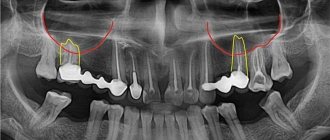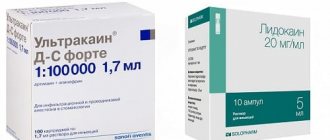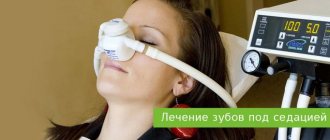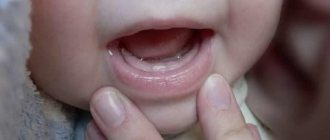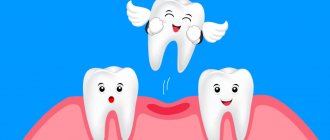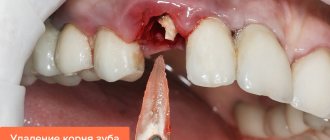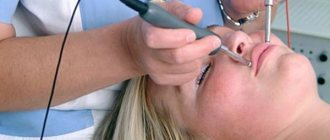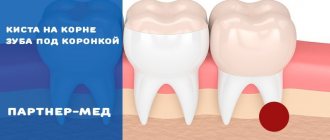Almost every person has dental problems. Often the tooth has to be removed. Tooth extraction is a rather traumatic procedure, after which a person feels pain, discomfort, and cannot eat normally. Some people are so unwell that they cannot even go to work or perform their work duties. Therefore, many working Russians have a logical question: is it possible to go on sick leave after tooth extraction or other complex dental interventions?
Let's figure out whether sick leave is given for dental procedures: extraction, treatment and prosthetics of teeth?
Is the bulletin required when visiting a dentist?
Modern dentistry is well developed, so in most cases there are no unpleasant consequences after operations.
Still, it cannot be guaranteed that tooth extraction will take place without problems, so doctors advise obtaining a certificate of incapacity for work in order to rest peacefully after the operation. But it is not always possible to draw up a document. 5 cases when a ballot is issued:
- Problems arise with molar removal. The doctor has to drill into the bone tissue or partially remove the gum. Such operations are often performed when the tooth has not fully erupted.
- A medical error has been made. Even an experienced doctor can make a mistake, which will lead to unpleasant consequences.
- The patient developed an allergic reaction to the drug. Often a person does not realize that he is intolerant to certain components of the medicine. Therefore, there is a reaction in the form of malaise or swelling. Sometimes hospital treatment may be required.
- Before the operation began, an infectious infection of the tissue around the tooth occurred. Do not delay visiting the dental clinic. Soft tissues are damaged while the tooth grows. This fact leads to infection occurring. You may need emergency medical attention.
Sick leave for tooth extraction is necessary for emergency surgery because the dentist did not provide the necessary preparation. After the removal of a wisdom tooth, a bulletin is issued for the entire period of inpatient treatment.
- The person does not feel well after the procedures, so a sick leave is required upon removal. Adverse consequences occur if hygiene is not maintained after removal.
An unfavorable consequence of the operation is a rise in temperature, swelling of the cheeks or gums. These reasons are enough for the dentist to give you a sick leave.
So, the reasons listed are enough to answer positively the question, is sick leave given for tooth extraction? The operation itself is not a reason to exempt a person from going to work. If complications arise, sick leave is issued.
Is sick leave given for tooth extraction, prosthetics, toothache?
The question of whether sick leave is given when removing a wisdom tooth or other teeth is relevant for many Russian citizens. After all, dentistry has certain specific legal regulations - therefore, both employees and employers should know whether sick leave is given for dental treatment, toothache or prosthetics. Otherwise, ignorance of the procedure for providing sick leave during tooth extraction can lead to unpleasant consequences for both the employee and the employer.
Duration for which the document is opened
The patient's health status affects the timing of document opening. If a person does not feel well after surgery, the rest period is extended after visiting the doctor. Dentists are mid-level medical specialists, and therefore have the right to issue a bulletin for five days. Therapists issue documents on incapacity for work for a period of ten to thirty days.
Important! Often the newsletter is issued by a general practitioner instead of a dentist. For this reason, in the “diagnosis” column there is no indication of surgery to remove a wisdom tooth.
The employer is being disingenuous if he says that only doctors at a state clinic can be released from work. The certificate can be issued by specialists from a private clinic. The main thing is that the organization has a license to provide medical services and conduct an examination of temporary disability (clause 2 of Order No. 624n).
Therefore, you can have a tooth removed in any clinic where it is convenient.
How to behave in the postoperative period (what can and cannot be done after dental implantation)?
After
It is important to strictly follow all the doctor’s recommendations and instructions, which will consolidate the achieved result and preserve the implants for a long time.
After dental implantation, you should regularly take measures to keep your mouth clean, which will prevent the development of complications in the postoperative period. Also, in the first days after surgery, it is important to observe a number of restrictions associated with the procedure performed.
After classical implant installation you should:
- For several days, refrain from any stress on the operated area. You should not brush your teeth, chew food on the affected side of your jaw, or do other activities that could damage the injured area of the gum. This will facilitate more complete fusion of the implant with the bone tissue, as well as faster healing of the postoperative wound.
- Sleep with your head elevated. To do this, you can place several pillows under your head at once. In this case, there will be an outflow of blood from the tissues of the head, which will prevent the development of bleeding and will help reduce swelling.
- Avoid rough and spicy foods. Such products can get on the affected area of the gums and injure it, which will be accompanied by increased inflammation and pain. During the first day after surgery, you need to eat only liquid, warm (not hot or cold) food - broths, yoghurts, cereals, and so on.
3 – 5 days after installation of the implant, the patient can return to everyday life, continuing to care for his teeth and oral cavity in the same way as he did before implantation.
As for immediate or express implantation, as well as the installation of a crown or prosthesis on an already implanted implant, there are no serious restrictions. This is explained by the fact that an artificial tooth is in no way inferior in strength to a regular tooth, as a result of which it is almost impossible to damage the crown with a toothbrush, hard food particles or hot food. In this case, the patient is recommended to brush his teeth regularly (morning and evening), and also use dental floss for more complete cleaning of the spaces between the denture and adjacent teeth, which will reduce the risk of infections.
It is also worth noting that after installing the implant, you should visit the dentist for preventive purposes at least 2 times a year. During the examination, the doctor will monitor the condition of the dentures, as well as examine the patient’s other teeth, which will allow timely identification and elimination of possible diseases and areas of caries, thereby preventing their progression and the development of complications.
Within 1 week after implant installation, it is recommended to rinse the mouth with a 0.5% solution
. This is done as follows. Taking a small amount of solution into your mouth, you should rinse all areas of the oral cavity with it (
) for 15 - 20 seconds, after which the solution must be spat out. The procedure should be repeated 2-3 times in a row, rinsing after each meal, as well as at night before bed.
Chlorhexidine is a disinfectant that has the ability to destroy pathogenic bacteria. Since brushing your teeth with a toothbrush is not recommended in the early postoperative period, rinsing the mouth with chlorhexidine can replace this procedure, providing reliable protection of the oral cavity from the development of infection.
After dental implantation, you can additionally take vitamin preparations, which can promote faster healing of the postoperative wound, as well as speed up the process of ingrowth of the implant into the jaw bone.
After dental implantation you can take:
- Vitamin C. Increases the strength of blood vessels, thereby reducing the likelihood of bleeding. This vitamin is also necessary for the normal development of connective tissue in the area of damaged gums and oral mucosa.
- Vitamin D. Necessary for the normal absorption of calcium by the body, which is used in the process of restoration and growth of bone tissue.
- B vitamins (B1, B6, B9, B12). Ensure normal tissue restoration after damage, thereby accelerating the wound healing process.
- Vitamin E. Has an antioxidant effect, that is, it prevents excessive tissue damage at the site of inflammation, which also accelerates the healing process of a postoperative wound.
During tooth implantation, the doctor makes an incision in the gum and destroys the bone tissue of the jaw, after which he inserts a foreign object into it (
). Despite the fact that all manipulations are performed in a sterile operating room, it is impossible to completely eliminate the entry of pathogenic microorganisms into the surgical wound. To prevent this from leading to the development of infectious complications, in the postoperative period the doctor can prescribe prophylactic doses of antibacterial drugs that will suppress the development of infection in the early stages.
The choice of antibiotic, as well as the duration and frequency of its use, depend on the nature of the operation, as well as the general condition of the patient. If the patient is relatively healthy and the operation was minimally traumatic, antibiotics will need to be taken for 3 to 4 days. If during the operation there was extensive damage to the tissues of the oral cavity, and also if the patient has a predisposition to the development of infectious complications (for example, with AIDS - acquired immunodeficiency syndrome, with diabetes, etc.), the duration of use of antibiotics can be 5 - 7 days.
Absolutely all patients who have undergone dental implantation will require pain relief in the postoperative period. This is due to the fact that after termination
) an inflammatory process will begin to develop in the damaged tissues, which will be accompanied by severe pain.
To reduce pain in the postoperative period, it is recommended to take non-steroidal anti-inflammatory drugs (NSAIDs). The mechanism of their action is that they inhibit the inflammatory process in the lesion, thereby reducing the sensitivity of the nerve endings located there and reducing the severity of pain.
For pain relief in the postoperative period you can take:
- Ibuprofen - 200 - 800 mg orally every 6 - 8 hours (depending on the severity of the pain syndrome and the effectiveness of the treatment).
- Paracetamol - 500 mg orally every 6 hours.
- Ketorolac – 10 mg orally 4 times a day.
- Nimesil (in powder form) – 100 mg orally 3 – 4 times a day.
It is important to note that these drugs can only be used for 5 to 7 days without a doctor’s prescription.
If a classic dental implantation is performed, after direct implantation of the implant into the bone tissue, you should refrain from eating or drinking liquids for at least 2 hours. The fact is that to insert the implant into the bone, you need to make an incision in the gum. After the procedure is completed, the damaged mucous membrane is sutured, but it takes some time for it to fully heal.
If you start eating immediately after suturing the gums, this may lead to the sutures coming apart and opening the wound, which will require a second visit to a specialist. Moreover, through an open wound, food particles and pathogenic microorganisms can enter the tissue and blood, which can cause the development of infectious complications.
If the patient undergoes basal implantation, express implantation or crown installation at the second stage of classical implantation, he can eat food within an hour after the end of the procedure. At the same time, it is not recommended to eat until the effect of local anesthesia (pain medication used during surgery) has completely worn off.
It is also important to note that if general anesthesia was used during the operation, as well as if the patient was put into medicinal sleep, he should not eat for at least 3 to 4 hours after the end of the procedure. The fact is that due to the effect of the drugs introduced into the body, the patient may begin to vomit.
It is not recommended to drink alcoholic beverages for at least 3 to 5 days after implant installation, as well as after immediate dental implantation, as this can lead to the development of complications. The fact is that any alcoholic drink contains ethanol (
). When entering the bloodstream, it causes dilation of the blood vessels of the skin and mucous membranes, which is accompanied by the influx of a large amount of blood to them. Dilatation of the vessels of the oral mucosa in the area of the gum incision can provoke the development of bleeding, as a result of which the patient will have to return to the dentist.
Moreover, ethanol can react with painkillers used during surgery (which are completely eliminated from the body only after a few days). This can lead to the development of allergic reactions, as well as depression of the central nervous system, as a result of which the patient may require urgent medical attention or even hospitalization.
Smoking after dental implantation is not recommended, as this can disrupt the healing process of the postoperative wound and implantation of the implant into the bone.
How to get a newsletter
To obtain the document you need to see a doctor. You need to have your passport with you. The forms are made on special paper with special watermarks. This precaution allows you to protect against document forgery. The document form was approved by the Ministry of Health and Social Development (Order No. 347n).
Only a clinic that has a license for medical activities has the right to issue a newsletter. Blood transfusion stations and emergency doctors do not have the right to issue documents of incapacity for work.
If a person sees a doctor on a working day, it is better to ask for a newsletter to be issued from the next day so that there are no problems with payment.
Do I need to notify the employer?
Labor legislation does not stipulate the obligation of workers to warn management about illness. No such norm is specified in 255-FZ of December 29, 2006 on temporary disability. The employer does not have the right to force employees to provide mandatory notification of their absences from work due to illness. Reporting illness is exclusively the employee’s right, but in no case is it an obligation. But the employer has the right to prescribe such a condition in the internal labor regulations of the organization.
The employee conveys a warning about temporary disability both orally (directly to the manager or through colleagues) and in writing, by drawing up a notice addressed to the manager. The application is drawn up in free form, indicating the diagnosis and estimated duration of the illness.
Summary
- A sick leave certificate for the removal of a wisdom tooth can be issued by a dentist or general practitioner.
- A dentist can take a leave of absence from work for five days, and a general practitioner can take a leave of absence for up to thirty days.
- In most cases, work release is issued by a therapist.
- For sick leave, special paper with watermarks is used.
- Payment for a certificate of incapacity for work depends on two years’ earnings and length of service.
- You can ask for a certificate at a private or public hospital. The main thing is that the clinic has a license to provide medical services.
New in filling out certificates of incapacity for work
New details have been added to the section on filling out sick leave.
- If social insurance pays temporary disability benefits directly to the employee, you only need to fill out the line “At the expense of the employer.” The lines “At the expense of the Social Insurance Fund” and “Total accrued” are left empty.
- The information that the employer fills out in the electronic sick leave must be certified by two signatures - the chief accountant and the manager. If the duties of the chief accountant are assumed by the manager, one of his signatures is sufficient.
- Calculations of sick leave benefits must be stored electronically or in paper form. They must be signed electronically or with handwritten signatures of the chief accountant and manager. If the position of chief accountant is not provided, only the manager signs the calculations.

